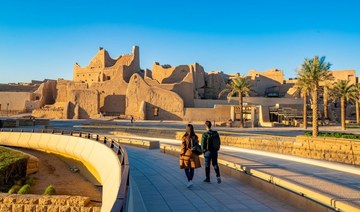JEDDAH: Malaysian prime ministers have generally captured the imagination of the Muslim world with their vision and commitment to creating a prosperous, just and equitable society. Whether it was the late Tun Abdul Razak, Mahathir Mohamad or Abdullah Ahmad Badawi, they were all admired inside as well as outside Malaysia. Their common aim was to build their country from the bottom up into the modern state it is today. Mohammed Najib Tun Abdul Razak, the current prime minister, is no different.
Ever since he took office as the sixth prime minister in April 2009, the affable, wise, popular and politically astute 63-year-old leader has set in motion a series of measures that has seen his country fight off recession and successfully overcome the slowdown in the global economy. Today, under his leadership, Malaysian state-run companies are operating international airports, including the one in Istanbul, Turkey. They are also among the three top bidders for Jeddah’s airport project.
More than his business acumen and vision, Najib Razak’s decision to become part of the Saudi-led 34-nation military alliance and his unflinching stand against foreign (read Iranian) interference in the domestic affairs of other countries are seen as his distinguishing characteristics. Those traits differentiate him from ordinary leaders and turn him into an extraordinary statesman. Son of the late Prime Minister Tun Abdul Razak, he was educated at St. John’s Institution in Kuala Lumpur and Malvern Boy’s College in Worcestershire, England, before earning a degree in industrial economics from Nottingham University.
The father of five children, Najib Razak has been in politics since the age of 23. During his current visit to Saudi Arabia, he spoke exclusively to Arab News on Tuesday evening in his suite at the Qasr Al-Sharq luxury hotel overlooking the Jeddah Corniche. He fielded questions on a range of issues, including the importance of Saudi Arabia in the Muslim world, why Malaysia chose to join the 34-nation Islamic Military Alliance, why Malaysia is against Russian intervention in Syria and why his country unreservedly condemned Iran for the recent attacks on Saudi diplomatic missions in Tehran and Mashhad. Throughout the interview, he spoke in a measured tone and, as is evident from his answers, weighed his words carefully.
Following are excerpts from the interview:
Q: Thank you, Mr. Prime Minister, for granting us this interview. What is on your agenda on this current visit?
A: The main purpose is to reaffirm the excellent state of bilateral relations between Saudi Arabia and Malaysia. And, in particular, to develop a warm and close working relationship with Custodian of the Two Holy Mosques King Salman and also with Crown Prince Mohammed bin Naif and Deputy Crown Prince Mohammed bin Salman. As part of the visit, I will be speaking at the Jeddah Economic Forum (which he did on Tuesday night) and I will also visit our soldiers and the soldiers of 20 other countries who are taking part in the North Thunder military exercise at King Khaled Military City in Hafr Al-Batin.
Q: Let me first ask you about trade ties. What is their status?
A: The level of bilateral trade between our two countries was $2.8 billion in 2015. This is a decrease from 2014 when it was $4 billion. This 16.4 percent decrease is due to economic headwinds and also because of the drop in oil prices. We want to take this relationship to a much, much higher level. A great deal depends on the price of oil because a huge chunk of our imports is crude petroleum and petroleum products.
Q: Before plunging into politics, you started your career with the Malaysian oil giant, Petronas. How do you see the volatility in the oil market?
A: It is good to have stability in the oil market. If the price is too high or too low, it is not good for the industry. You need to hold the price at a certain level so that it will allow investment in technological improvements and innovation. At the same time, it should not be too high because then it will lead to development of alternative sources. For example, shale oil came into play and...
Q: Changed the whole dynamics?
A: Absolutely. Yes.
Q: So what, according to you, is an ideal price for a barrel of oil?
A: I don’t know. I am not the expert. We would think that anything in the region of $40, plus or minus, is desirable.
Q: As defense minister, you changed the Malaysian military inside out. You turned it into a leaner and more robust military force. Now you are part of the Saudi-led 34-nation Islamic Military Alliance. Can you give us an idea about the abilities of your military?
A: Before I took over, our military was seen purely as a counterinsurgency force. We have done very well in eliminating the threat of communism. The Communists laid down their arms, and that is how we won the fight against Communist terrorists in our country. When I took over as defense minister, I developed a new defense policy.
Q: This was in the 1990s, right?
A: Yes, I am talking about 1990. That is when my first term as defense minister began.
Q: So you developed a new defense policy?
A: I developed a modern force, in the sense that it became a much more conventional military force with certain capabilities. I also stressed the need to have a combined fighting force. In other words, it must be seen as a force where all the three services are involved. I basically integrated the three services — land, air and navy.
Q: As we mentioned earlier, you are part of the Islamic Military Alliance created by Saudi Arabia with the participation of 34 countries. What is the message that you are sending by being part of this alliance?
A: Well, we are taking part in the military exercise, called North Thunder, so that we will have the capability to operate as part of a coalition. We are not involved in any actual military action in the region. With our participation in North Thunder, we want to send a strong signal that the security of Saudi Arabia is very important to us. We have a token force at the North Thunder, but we feel it is a very auspicious beginning. We have started small, and perhaps later on we will increase our level of participation (in the alliance).
Q: Do you think this alliance has come at the right time? Or it should have taken place much earlier?
A: It has come at the right time because the unity of the Muslim nation cannot be mere rhetoric. It has to be expressed by action. Saudi Arabia is under threat. Therefore, countries that are supportive of the Kingdom must be ready to stand by Saudi Arabia. Our actions must indicate our solidarity with Saudi Arabia. Being members of the Islamic Military Alliance sends a very strong signal that Saudi Arabia is not alone in facing the threat that may endanger it.
Q: Where do you place Saudi Arabia in the Muslim world?
A: Saudi Arabia is a key country in the Muslim world. It is the land of the Two Holy Mosques. It is important for us to ensure stability and peace in the Kingdom so that Saudi Arabia can provide the leadership to ensure that the two most revered places of worship continue to remain open to Muslims. I have developed a very close rapport with King Salman. I had a close and warm relationship with the previous king as well. I am looking forward to meeting King Salman. (He met King Salman in Riyadh on Wednesday). I am also looking forward to meeting the crown prince and the deputy crown prince.
Q: How do you see the regional conflicts and what is Malaysia’s stand on them?
A: It is important that we should not allow foreign interference in domestic affairs. That exacerbates the situation. There should be no foreign interference — direct or indirect, covert or overt. Interference fuels conflict and tension in the region. We must always strive for political and diplomatic solutions because military solutions cannot secure long-term peace.
Q: Talking about interference, Saudi diplomatic missions were recently attacked and torched in Iran. Malaysia was among the first to condemn the attacks, wasn’t it?
A: Yes, we condemned it unreservedly, because we believe any embassy is sacrosanct and its security must be safeguarded at all times.
Q: What is Malaysia’s position on Syria? Is it aligned with the Saudi position?
A: More or less. Our position is that there has to be a political and diplomatic solution. We would not like direct foreign intervention in Syria because that has not helped. If the conflict goes on, it will be fertile ground for extremist groups, such as Daesh, to gain greater influence and even territory. This will create a threat to many countries.
Q: You mentioned the threat of Daesh. Let me ask you this: The mainstream view is that Daesh is a direct reaction to the terrible atrocities committed by Iranian militias and Iranian-backed terrorist organizations, such as Hezbollah, in Iraq and Syria?
A: There are many theories behind the rise of Daesh. The jury is still out. Whatever the genesis of Daesh, its actions are very brutal and do not reflect the true face of Islam. Malaysia is very much with Saudi Arabia and other like-minded countries in dealing with the threat with all necessary strength.
Q: What is Malaysia’s stand on Bashar Assad?
A: We favor the general principle of a diplomatic solution. What started as a domestic problem should have been solved domestically, but instead it has opened the door to foreign countries and the entry of foreign powers. This has complicated matters.
Q: Mr. Prime Minister, when you talk about the general principle of no foreign interference in Syria, do you also mean the Russian intervention?
A: Yes. We don’t support Russian intervention in Syria.
Q: How are Malaysia’s relations with Iran?
A: We have a good working relationship with Iran but when sanctions were applied against Iran by the United Nations, we also applied them. In other words, we imposed the same sanctions that were imposed by the United Nations. We are against Iran having a nuclear capability, but Iran can develop nuclear power for peaceful purposes.
Q: Malaysia has been a very vocal and integral member of the Organization of Islamic Cooperation (OIC). Ordinary Muslims feel that the OIC has not lived up to expectations. What are your thoughts?
A: We would like to see a more resurgent OIC. There is going to be a summit in Istanbul in April, which I will attend. We hope that something positive will come out of the meeting.
Q: Despite being a predominantly Muslim country, Malaysia is known for its multicultural ethos. We don’t see the kind of extremism and upheaval in your country that we see in other Muslim countries. What lesson can other Muslim countries learn from your example?
A: The solution to all our troubles can be found in Islam because Islam is a religion that preaches moderation. I have started an initiative called the Global Movement of Moderates which is based on the concept of “Wasatiyyah,” meaning the middle path or moderation. This is an Islamic concept. The concept promotes mutual respect. Even during the days of Prophet Muhammad, peace be upon him, Islam coexisted with other religions. This can be used as a basis to promote common core values among people of different faiths. Malaysia has always believed in multiculturalism and a multireligious society. We have been able to ensure social harmony and peace. Of course, there have been challenges. What is important for us is to work for common values and ensure that those who abuse or exploit sensitive issues that affect or hurt the feelings of any community are dealt with in accordance with the rule of law.
Q: Your Excellency, you have just come back from performing Umrah. What was uppermost in your prayers when you were circumambulating the Holy Kaaba in the Grand Mosque in Makkah?
A: There is so much violence in the Muslim world. We see that on a daily basis. As a Muslim leader, it is very sad to see that more Muslims are dying at the hands of Muslims than by non-Muslims. We still have major unresolved problems. The Palestinian issue, for example, is still unresolved. Some Muslim countries have been rendered ungovernable. Libya, for example. And the rise of extremism in many parts of the Muslim world. The unfortunate part is that the actions of some groups have led to very negative reactions in the West toward Islam. The rise of Islamophobia is a great concern.
Q: Malaysia has played the role of a facilitator between the Moro Islamic Liberation Front (MILF) and the Philippine government. There has been a severe setback to the peace process. Can you share something on that with our readers, many of whom are Bangsamoros and Filipinos?
A: I just had a meeting with Haji Murad Ebrahim, chairman of the Moro Islamic Liberation Front, and I urged him and convinced him to continue the path toward peace, toward the final resolution of the Bangsamoro Basic Law which is yet to be passed by the Philippine Congress. Unfortunately, the term of the present Congress will expire soon. Or, in fact, has already expired. The law will not be passed by the current Congress. It will have to wait until a new Congress and a new president takes office. We hope that whoever comes after Benigno Aquino III will be as committed as he was because it is of no interest to anybody, for us or to anybody, including the Philippine government, to see a new cycle of violence in the southern Philippines (Mindanao).
Q: Is there anything you would want to add?
A: I would like to look into the ways and means of deepening Malaysia’s relationship with Saudi Arabia. For example, Malaysia has been awarded the Al-Mashaaer Al-Mugaddassah Makkah Metro Southern Line project. In some of the key infrastructure projects in the Kingdom, Malaysian companies could be given a chance to compete. They can be considered for those projects. A Malaysian state-run company, Malaysia Airports Holdings Bhd (MAHB), is bidding to manage King Abdul Aziz International Airport in Jeddah. We are among the three bidders for the project. We have extensive experience in managing international airports, including the one in Istanbul. We won the Istanbul airport project through competitive bidding. So, we would like to increase the footprint of our companies here in Saudi Arabia.
Q: Thank you very much, Mr. Prime Minister.
A: Thank you.
Saudi Arabia’s security is very important to us: Najib Razak
Saudi Arabia’s security is very important to us: Najib Razak

KSrelief provides 500 mobile homes for Syrian refugees in Jordan

RIYADH: The Kingdom’s aid agency KSrelief has provided 500 new mobile homes for Syrian refugees in Zaatari camp in Jordan, the Saudi Press Agency reported on Friday.
The homes are for the most vulnerable families, including new arrivals and newlyweds.
Meanwhile, in Yemen, the aid agency’s sanitation project has provided over the past week 12.2 million liters of water for residents in Saada, Hajjah and Hodeidah.
Over 40,000 people in Yemen are benefitting from this initiative.
These projects are a part of the Kingdom’s humanitarian and aid efforts to assist people in need across the world.
Man arrested in Jazan for transporting 10 illegal migrants

- Saudi border guard land patrols also foiled an attempt to smuggle 30 kg of hashish into Al-Raboah, Asir
RIYADH: Al-Afwaj security patrols in Al-Arida, Jazan, arrested a Saudi citizen for transporting in 10 Ethiopians, who illegally crossed the Kingdom’s border in his vehicle.
The 10 Ethiopians were referred to the relevant authorities and, subsequently, to the Public Prosecution.
Media spokesperson of the Ministry of Interior’s Al-Afwaj Regiment said that anyone found to be facilitating illegal entry to the Kingdom, including providing transportation and shelter, could face imprisonment for a maximum of 15 years, a fine of up to SR1 million ($260,000), as well as confiscation of vehicles and property.
Meanwhile, Saudi border guard land patrols in Al-Raboah, Asir, foiled an attempt to smuggle 30 kg of hashish.
Preliminary legal procedures have been completed, and the seized items were handed over to the relevant authority.
Elsewhere, Saudi Border Guard land patrols in Al-Aridah, Jazan, foiled an attempt to smuggle 140 kg of qat. Preliminary legal procedures have been completed, and the seized items were handed over to the relevant authorities.
Patrols of the General Administration of Mujahideen in the Eastern Province arrested a citizen for selling amphetamines.
Citizens and residents with information on drug smuggling or trafficking A few asked to call 911 in Makkah, Riyadh and the Eastern Province, and 999 in the rest of the Kingdom. They can also contact the General Directorate of Narcotics Control at 995 or email: [email protected]. All reports are treated confidentially.
Saudi Red Sea Authority issues marina licenses

RIYADH: The Saudi Red Sea Authority has issued licenses for three tourist marinas: Al-Ahlam Marina in Jeddah and Jazan, and the Red Sea Marina in Jeddah.
The authority is issuing licenses to regulate marine tourism in an effort to achieve the goals of the Kingdom’s Vision 2030 in building the coastal tourism sector.
In regulating the operation of marinas, the authority can improve the quality of services provided to tourists and visitors, and preserve and sustain the marine environment.
Regular field visits are carried out by the authority to tourist marinas in Jeddah, Jazan, Al-Lith and Yanbu, to provide technical and consultative support.
Marina operators must ensure compliance with international standards to receive a license from the authority.
Saudi Red Sea Authority began its journey toward building and regulating the coastal tourism sector in 2021, with the objective of enhancing integration among relevant entities by issuing licenses and permits, and formulating essential policies and strategies, assessing infrastructure requirements, preserving the marine environment, attracting investments, and fostering navigational and marine tourism activities.
How a Saudi healthcare startup is using AI to transform the diagnosis of chronic diseases

- The work of SDM highlights the impact AI can have on the accessibility and increased accuracy of diagnostics
- The firm has already served more than 30,000 patients over the last two years at clinics across Saudi Arabia
RIYADH: Healthcare startup SDM is using artificial intelligence to make healthcare efficient, accessible and potentially life-saving by detecting the stages of chronic diseases such as diabetes through retinal imaging analysis of the eye.
“When you hear the phrase ‘your eye is a window to your body,’ it’s actually the retina that is the window to any systemic diseases,” Dr. Selwa Al-Hazzaa, CEO and founder of SDM, told Arab News.
Since launching in 2018, SDM has worked on filling the gaps in the health sector as a developer of digital technology solutions to promote well-being and accessibility in remote communities across the Kingdom and beyond.
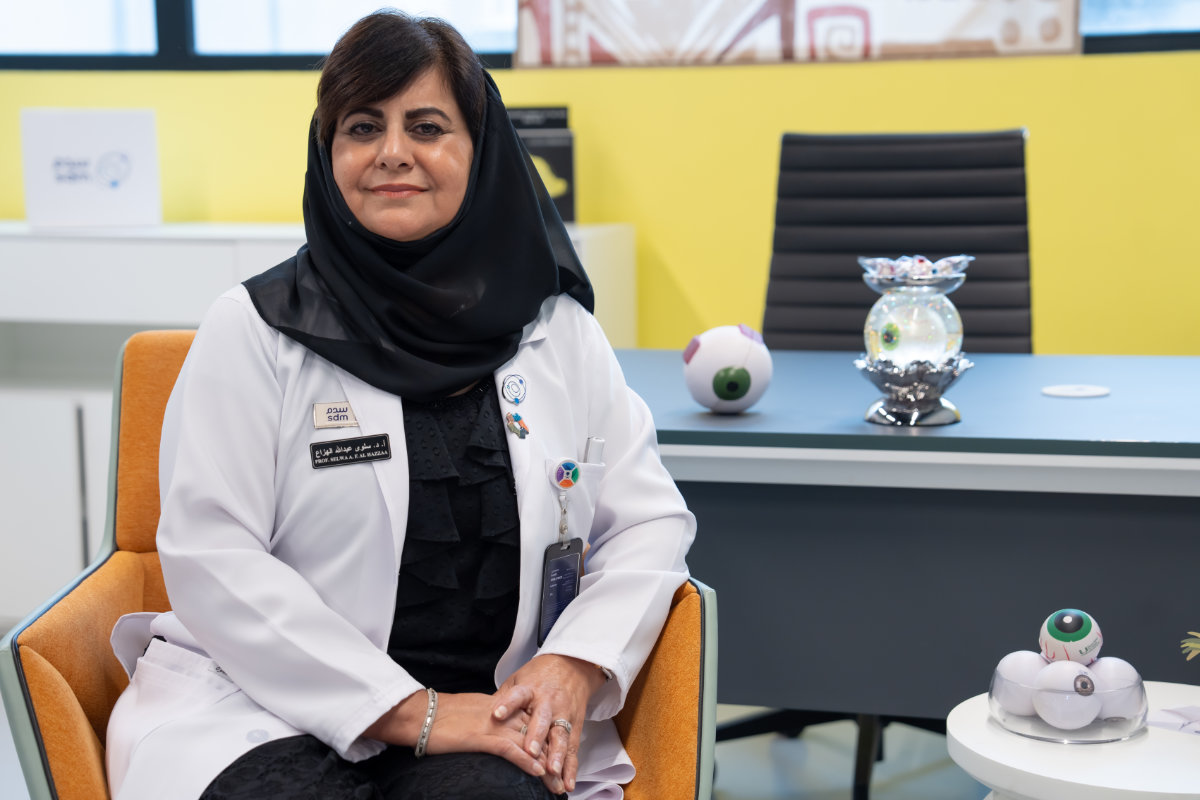
Al-Hazzaa, along with her co-founder and managing director, Naif Al-Obaidallah, have had a longstanding passion for making healthcare accessible and low-cost, with the belief that “everyone should have access to healthcare.”
Al-Obaidallah told Arab News: “Everyone should have a right to see a doctor or get treated.”
A trailblazer in the field of AI medicine, SDM combines AI technology with Al-Hazzaa’s 40 years of experience, partnering with nonprofits to carry out a comprehensive mass detection of chronic diseases through the retina.
“I had a dream that I wanted patients to be examined and get good quality care without actually coming to Selwa Al-Hazzaa in a specialized hospital,” she said. “I kept asking myself: Why can’t I take my experience, put it in a package, and give it to the community?
“By the time many patients come to me, it’s already too late and they’re blind. There had to be a way that I could reach the community. And this was when SDM was born.”
The result was an accessible and automated healthcare service that does not require physicians to be on site, thereby reaching tens of thousands of people across the Kingdom.
The World Health Organization estimates there are 7 million diabetics in Saudi Arabia. Within the region, eye disease is the main cause of blindness and 10-12 percent of the population in Saudi Arabia with diabetic eye disease go blind if the condition is not treated.
Only an estimated 24 percent of patients have been screened for diabetic eye disease in Saudi Arabia, while 76 percent remain unexamined.
The work SDM is doing highlights the impact AI can have on healthcare and the mass outreach of health diagnostics at reduced cost and increased accuracy. SDM has already served more than 30,000 patients in more than 13 centers around the Kingdom over the last two years.
“Our focuses are specifically on rural areas, places that don’t have access to highly specialized doctors,” said Al-Obaidallah. “In a given day, sometimes we’ve seen over 150 patients. And that’s all using AI and deep learning. It’s a very trusted way of diagnosing.”
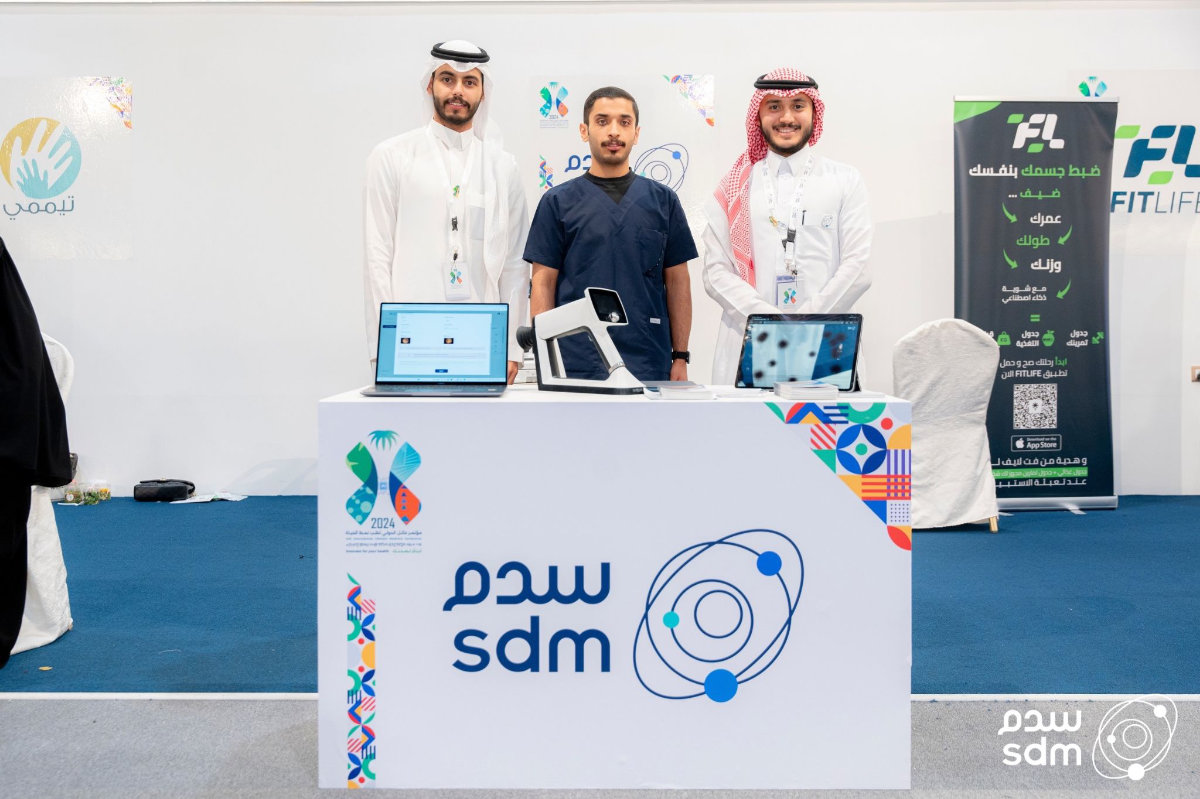
SDM has benefited from the support of “success partners” at NEOM, the Ministry of Communication and Information Technology, the King Abdullah University of Science and Technology, Saudi Telecom, Al-Faisal University and business incubator “The Garage.”
In order to grasp the revolutionary impact of what SDM is doing, it is necessary to understand how disease detection is traditionally conducted.
At the Kingdom’s diabetic centers, patients are typically seen by pathologists, endocrinologists, cardiologists and podiatrists. However, patients do not usually see ophthalmologists, who are technically surgeons and found in hospitals.
As a result, eye disease screening is often overlooked, potentially leading to complications down the line.
“The patient traditionally would only be sent to take the photo of the retina if they complained. But the symptoms only come in diabetes in the late stages,” said Al-Hazzaa.
“They would save the photos until the ophthalmologist came to visit, which would be maybe once a month or twice a month, depending on the collaboration with the ophthalmology clinics.”
Opinion
This section contains relevant reference points, placed in (Opinion field)
Unlike traditional healthcare methods, SDM has developed technology to make detection automated, instant and seamless with results reaching the patient in a matter of minutes, clearing obstacles to treatment.
When a patient comes into an SDM clinic, a trained technician photographs the back of their eye using a specialized instrument called a fundus camera. The image is then sent via a secure cloud for AI diagnostics.
“Within minutes, the report comes out either in English, which is then integrated for the doctor, and in Arabic, where the patient is actually given the PDF report in his or her hand,” said Al-Hazzaa.
“It is totally run by technicians, photographers, nurses, even primary care physicians — all these healthcare personnel, who have no experience whatsoever with eye diseases.”
Al-Hazzaa underlined the ease this technology provides for patients, healthcare providers who are taking the photos and the endocrinologists who see the patients following the examination.
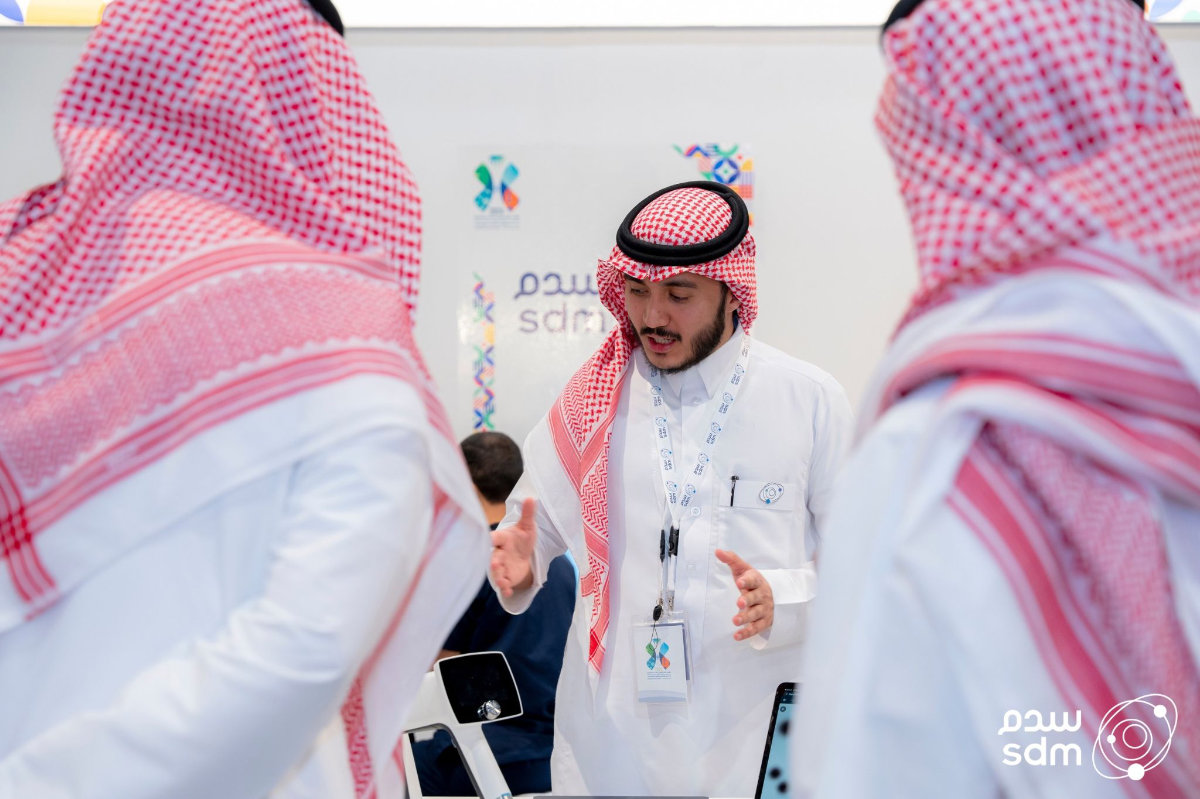
In terms of accuracy, Al-Hazzaa said the technology outperforms even the most experienced physicians in detecting problems.
“I can tell you the algorithmic solution is now much more sensitive than me,” she said. “The best I could do was 93 percent. The AI solution has actually reached over 95 percent.
“The unique thing is, not only are you using automation, which is convenient for the patient, convenient for the healthcare provider, but you’re also introducing automation at a sensitivity that is much greater than your board-certified retinologist, not just ophthalmologist.”
Like workers across many sectors, the uptake of AI tools among physicians has been slow to catch on, as many fear that mass adoption could ultimately cost jobs.
“They thought: ‘Here’s a machine that’s much more accurate than us, that’s faster than us, and it’s going to take our place.’ They were very reluctant,” said Al-Hazzaa.
“After one year of being in the diabetic center, the ophthalmologist actually came back to me and said: ‘Dr. Selwa, thank you. You improved our surgical skills because you have taken all the routine repetitive exams that we are no longer interested in’.”
Diabetic eye disease is not the only condition SDM is able to detect through the AI analysis of retinal imaging.
“With the picture of the retina, which is the back of the eye, you can detect at least 20 diseases,” said Al-Obaidallah.
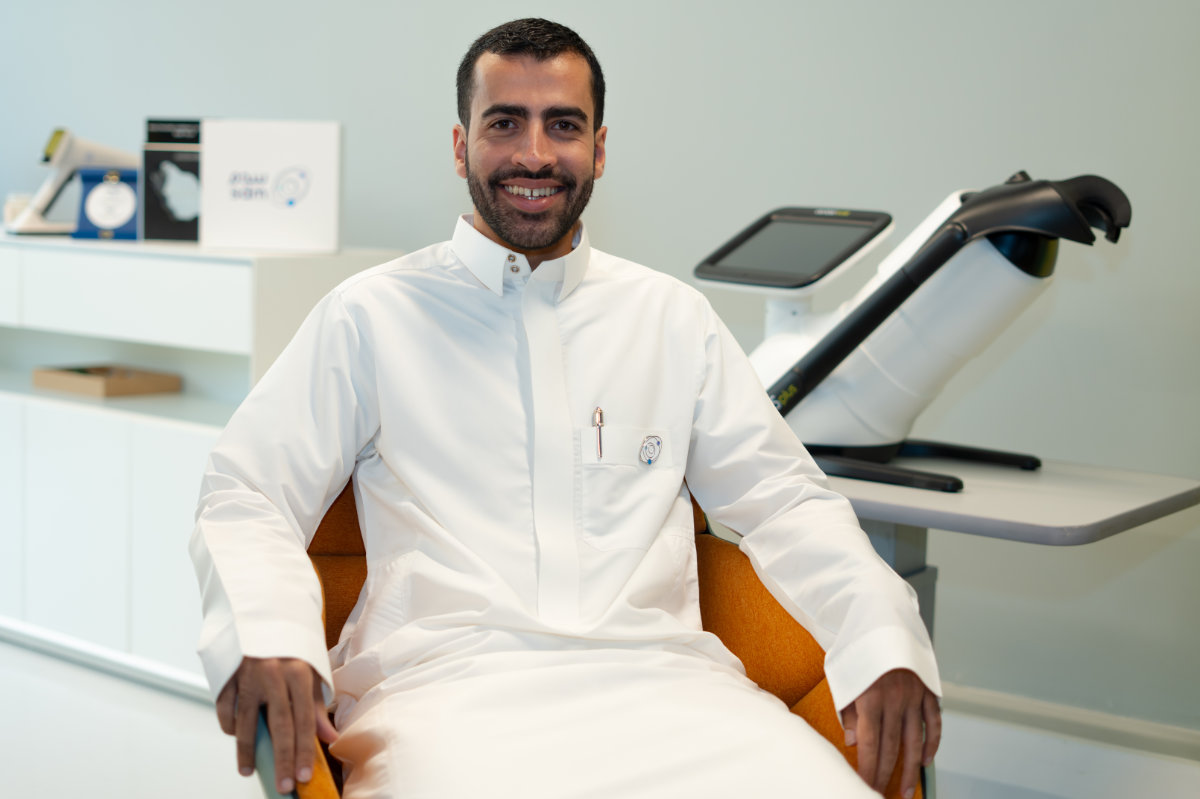
“We’re working on a lot of other diseases, whether it is glaucoma, hypertension, Alzheimer’s, which can be diagnosed and detected with a picture of your eye. It’s mind-boggling to see how the eyes can basically tell you everything about your body. And it’s done in a very basic way. There is no surgery needed.”
As part of its mission to make healthcare more accessible, SDM is working with a mobile diagnostics center in Madinah to reach patients in rural areas.
After some initial delay in securing regulatory approval, SDM’s innovative technology has since rapidly advanced.
“Artificial intelligence as a whole, maybe in some industries, it’s there and it’s in use,” said Al-Obaidallah. “But in healthcare, it’s still fairly new. So, when we work on something, we’re basically paving the way.
“We worked with the Council of Health Insurance on coding, the use of artificial intelligence in healthcare, specifically, in our exam, in our product.
“We were basically the first company to work with the CHI on the new Saudi billing system, to introduce artificial intelligence as a billing code for hospitals and insurance companies to use.”
However, all of SDM’s services are provided free of charge in partnership with nonprofits.
“Everything is free. No one pays anything,” said Al-Obaidallah. “Our goal is for patients to have the right to diagnosis of chronic diseases.”
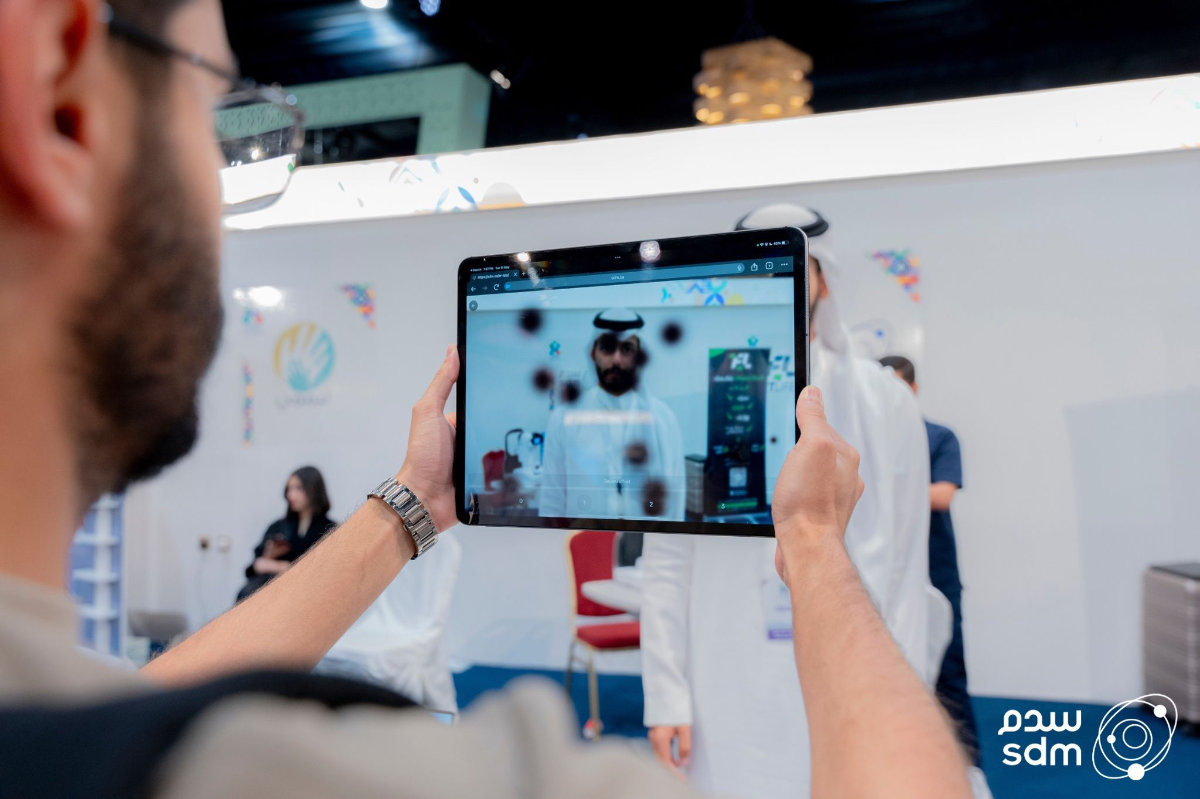
Beyond diagnostics, SDM also recently announced new software utilizing generative AI. “It’s basically a large language model, an LLM, which is a very hot topic,” said Al-Obaidallah.
“Recently, everyone’s been talking about generative AI. So, we’ve worked on a generative AI model that is more of a chatbot that you ask any question related to diabetes. And it would basically give you an answer.
“We’ve been feeding it with journals, publications, specifically, chosen by experts in the field to make sure that this gives you clear and straight answers.”
Looking five years into the future, Al-Hazzaa hopes to move from predictive AI to generative AI using LLMs.
“I know with confidence that SDM will not only be treating diabetic diseases, but we will be going into other chronic diseases such as predicting hypertension, stroke and Alzheimer’s,” she said.
“We will also be looking into other chronic ophthalmology diseases such as glaucoma, such as age-related macular degeneration.”

Innovators challenged to improve pilgrim experience for people with mobility issues

- During a week-long event, 250 people on 39 teams are working to develop innovative products and services to serve the mobility needs of pilgrims
MAKKAH: Innovators and entrepreneurs have been challenged to find ways to enhance the pilgrim experience in Makkah for people with mobility issues.
To help them develop solutions, provide support and encourage collaborations, the General Authority for the Affairs of the Grand Mosque and the Prophet’s Mosque, Umm Al-Qura University and investment business Wadi Makkah Co. organized a week-long event that began at the company’s headquarters on Sunday.
The specific goal is to improve pilgrim services through the development of innovative ways to help people who find it difficult to complete Hajj rituals such as Tawaf (walking around the Kaaba in the Grand Mosque seven times) and Sa’i (moving repeatedly between the Safa and Marwah hills at the mosque). The challenge includes four categories covering the use of manual wheelchairs, electric vehicles, golf carts and trailers, and a fifth, open section for creative mobility ideas.
Ali Al-Shaery, the CEO of Wadi Makkah, said he was proud of the company’s participation in this collaborative effort, and highlighted the significant role it can play in improving pilgrims’ mobility.
“We are contributing to realizing the Vision of our beloved kingdom, enriching the experience of pilgrims, and increasing the number of pilgrims and Umrah performers by 2030,” he said.
“Through this challenge, we aim to provide participants with a knowledge boost, cultural enrichment and empowerment through specialized workshops and expert mentors.”
The general authority is giving participants a sense of the nature of pilgrim-mobility issues, he added, while mentors from Wadi Makkah are providing technical, innovative and entrepreneurial knowledge.
A panel of judges from various sectors related to Hajj and Umrah will select the most promising solutions proposed during the event, Al-Shaery said.
Ammar Attar, a faculty member at Umm Al-Qura University and coordinator of the mobility vehicles category of the challenge, said it was important to engage the academic community in efforts to tackle real-world issues.
“We aim to activate the role of faculty members, students and researchers in designing creative and innovative solutions that enrich the Tawaf and Sa’i experience,” he said.
He added that 250 people on 39 teams are working with the best tools to develop innovative products and services that can best serve the needs of pilgrims.
Ahmed Morsi, an entrepreneurship projects engineer with Wadi Makkah, said participants in the challenge have been provided with the tools they need to help come up with ideas that can significantly improve the pilgrim experience through the use of manual and electric wheelchairs, golf carts and trailers.
“Mentors have been provided to offer guidance and advice during the challenge period in developing ideas, designing products and building the first model, with the aim of assisting innovators, entrepreneurs and the Makkah community in creating a conducive environment and providing all essentials for achieving success stories that enhance the experience of pilgrims and Umrah performers,” Morsi added.
Prizes of SR10,000 ($2,666) will be awarded to the best projects chosen by judges in each of the five categories.








